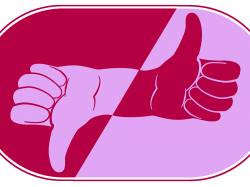Tag Archives: twitter

Where are we all going? It’s Mastodon right?
OK listen. As a blogger who relies on social media to do important work (keeping up with Sex News, responding to journo requests, promoting blogs and audio porn, and shamelessly bragging whenever I get railed by a hot guy), I cannot fully disappear from Twitter until someone turns out the lights. While people who matter remain on the platform, I’ll still have to maintain a presence there – scheduling posts to go out so that people in different time zones get the chance to beat one out to them too. But let’s face it, it’s run by a fascist toddler and is now so choked up with spam that it’s borderline unusable. Plus, as a sex blogger, I have now been so shadowbanned that even the grown-ups who follow me are unlikely to see my extremely high-quality tweets. I need a new social media home, otherwise where else will I post my scorching hot takes? So I’m calling this for now: fuck BlueSky, fuck Threads, you can find me on Mastodon. Here’s why.

Fuck your Twitter followers. Yes, literally
Lots of people bemoan the fact that social media is a bubble, filled only with people who agree with you. It gives a skewed worldview, and leads to things like me weeping with bitter tears the morning after the Brexit vote, because I couldn’t quite believe the world wasn’t quite as I’d imagined it. But there are up-sides: your Twitter feed, properly curated, can essentially be a long list of people whose opinions, ideas, and words you find sexy. Given this, you may want to consider fucking them.

Sex news: Twitter safe search and NSFW etiquette
Sex news this week: lots of people have been tweeting about Twitter’s safe search, which is now ‘on’ by default for a number of users (including me, which is WEIRD). If you’re following sex bloggers, porn performers, and other people who tweet adult content, here’s a quick guide on how to turn off Twitter safe search, and a little bit of info on NSFW etiquette and my own rules around tweeting sexy pics. As a bonus I’ll also give you some tips on how to support your local neighbourhood sex bloggers/adult content providers who might be getting a little bit downhearted by changes to adult content…

On ‘all feminists’
There’s a lot of bullshit spoken about lots of things, and never is the quantity of bullshit larger than when it comes swiftly behind a statement that ‘all’ people of a certain type are a certain way, or have certain problems. Sure, catch-all statements are often a handy shortcut, but the more you try to crowbar into that statement the greater the chance of it stinking like a dungheap.
So, in light of Some Things I Have Seen On The Internet Recently, I feel compelled to highlight a few things about feminists. Specifically, things that – while true of some of us – are categorically not true of all of us. Here are some things that ‘all feminists’ are not:
Subject to unrelenting abuse
Some people are showered with quite horrific and appalling abuse on the internet. One of the many things that ignites the ire of a miserable and hate-filled human is a woman who not only has some opinions but has the temerity to actually say them out loud. Why, it’s enough to make them want to commit a criminal offence on Twitter. This behaviour is, naturally, disgusting.
However, I’m worried that the total shitstorm of the last few days, while fantastic at highlighting what is a genuine problem for many people, has been painted by the media as a problem for ‘feminists’ (as evidenced by the fact that articles on the topic nearly all seem to refer to a ‘feminist journalist’ or ‘feminist MP’, as if a feminist is a surprising and unusual thing to be). People behaving appallingly to each other is not just a problem for feminists – it’s a problem for our entire society. Moreover, although many of the most prominent victims of Twitter threats are loudly and proudly feminist, there are many people who receive this kind of abuse who are not.
Additionally, I want to point out that although being a loud, stampy feminist might mean you’re more likely to be targeted by a subset of antisocial cockwipes, you aren’t guaranteed to get this treatment just because you are a feminist. Why is it important to say this? Two reasons:
– I don’t like the implication that you could make the abuse stop by just calming your feminist views down a bit, or shutting the hell up.
– I don’t want to think that there are people who’ll be too scared to talk about their opinions because a few unconscionable cunts fire all-caps hate-tweets at prominent women.
You might get shit: you might not. I just want you to know that it’s not guaranteed, and it’s not something you can prevent just by not having an opinion. On to the next thing ‘all feminists’ are not:
Women
Some of my best feminist friends are men, and all that. More importantly, these feminist men fall into the same camps as the people in the previous category: some of them get awful abuse and threats on the internet, others don’t. There is no way of predicting or preventing this stuff on an individual basis. Whatever your views on how we, either technologically or as a society (or both) deal with the problem of online harassment, there’s never a way that you, as an individual, can prevent this.
Fighting all of the time
Another thing ‘all feminists’ aren’t doing. There’s a big discussion going on about how we deal with internet harassment. I’m undecided on the best solution because – as with most complex issues – there is nothing that leaps to the front of my mind and screams “BUT THIS IS SO OBVIOUS AND HAS LITERALLY NO DRAWBACKS.” Naturally, there’s debate – sometimes heated. However, it depresses me that the nuanced, carefully thought through arguments from a number of intelligent people have been boiled down into either ‘feminists are fighting with each other over a Twitter button’ or, even more worryingly ‘feminists are fighting everyone else over a Twitter button.’
It’s a fucking debate – we’re all supposed to be fighting. And I think, when this many people are involved, you can reliably say that this isn’t a ‘feminist’ issue – it’s a ‘people’ issue.
The same
As evidenced by the fact that a feminist can be male or female, pro- or anti-Twitter button, troll, trolled or indifferent, it’s fairly safe to say we’re not all the same. I appreciate that ‘feminist’ is a handy catch-all for some issues, but this definitely isn’t one of them.
It’s a people issue. It’s not a niche interest or campaign that we can cheer on from the sidelines but ultimately will never affect us: it’s about how we as a society behave towards each other, and we all – feminist or not – need to get stuck in.

On why you shouldn’t get fired for internet prickery
The problem with human interaction is that it’s so fucking nuanced. I mean, why can’t people just be obviously good or evil? It would be much easier to decide whether we should give someone a knighthood or throw them to the wolves.
There’s been a trend recently that I find utterly disturbing, of people being hauled over the coals for misjudged (and sometimes utterly prickish) comments that they have made on the internet, and I’d like to take a bit of time to lay down some ill-thought-out rules and opinions. If you want to skip the waffle, go straight to my 3-step guide to not being a prick on the internet.
In the meantime, here’s why I don’t think you should be fired from your job for being rude on the internet.
Representing your company
You, as an individual, are representative of your company, right? Wrong. I feel quite strongly about this, and it is my duty as an anonymous sex blogger to point out that nothing I write on the internet in any way relates to my job. If it did, my job would be far more interesting.
Yes, if you’re tweeting from a company account, you should conduct yourself as if you were on company business – no gratuitous swearing or trollery. This should be fairly common sense. But just as I wouldn’t expect to conduct a pub chat as if I were chairing a meeting, likewise I will say things on my personal Twitter feed that I would never say at work.
But when people who tweet personally are then linked to their job, the waters get a bit muddy. This week Grace Dent received what I can only describe as a tawdry, prickish insult on Twitter. Rather than ignoring or blocking the offending person, she clicked through to his biog, where he had a link to his personal website that had a link to the company where he worked. A company that happened to represent Grace Dent.
This man was an idiot. By his own admission he shouldn’t have posted it. Were I his boss I’d be having a serious chat with him about the nature of social media, and insisting that he remove all links to his workplace from his profile. But I categorically do not think that he should be fired.
If he’d threatened her, yes. If he’d been bigoted, or obviously inciting hatred, maybe. But he made a stupid joke about her looks. The problem is that this is a level of reasonably inane and harmless cuntery compared to hate-speech and threats, and we find it hard to come up with a solution that deals with the nuance. Grace Dent has decided that she would like him to be fired.
I have a lot of respect for Grace Dent, who is the epitome of everything I admire – someone who gets paid to write funny stuff on the internet. But in this case I think she’s desperately wrong.
Pic and Mix rules
If you accept that what you say on Twitter is subject to scrutiny by your workplace, you have to accept that your workplace could skip over the insults you’ve written and instead concentrate on the more personal/political things that you say.
It’s then more than possible to end up with situations where someone will be censored not because what they’re saying is offensive, but because it isn’t in line with company policy.
You could tweet about a political figure on whose good side your company would like to stay. You could say something negative about an organisation that your own company is about to partner with. In the case that inspired this post, you could say something rude about a client of your company. Or finally, in a sudden and sledgehammer admission of my own personal interests in this tale, you could tweet about piss play and get fired for being a pervert.
I’m not saying people should say and do what they like and damn the consequences. It’s of the utmost importance that people at least try to conduct themselves with courtesy and respect, because otherwise society will fall to bits and you’ll end up sitting at a laptop in the middle of a nuclear armageddon typing “OMG u r a troll you fat slag lolz” while the remnants of civilisation crumble to dust around you.
All I’m saying is that we should be careful what we wish for – accept that a man gets fired for being catty about a client and we have to accept a certain degree of company interference in tweets that we post on our personal stream. And that way lies unemployment for political bloggers, interestingly opinionated tweeps and – most importantly – me.
Final thoughts:
To prove I’m not advocating total anarchic trollery, and for those unsure of how to conduct themselves online, I have compiled a handy 3-step guide to not being a prick on the internet. Please print out, affix to your screen, and have a glance every once in a while before you post rude things about powerful journalists.
Three-step guide to not being a prick on the internet
1. Got a criticism that is threatening, illegal or hate-filled? Don’t post it.
2. Got a criticism that doesn’t fall into category 1 but would be hurtful to the person on the receiving end? Don’t @ them in it.
3. Got a criticism that is thoughtful, interesting and genuinely contributes to the discussion? @ the author, reblog, talk about it, or spaff your wisdom intelligently in the comments.